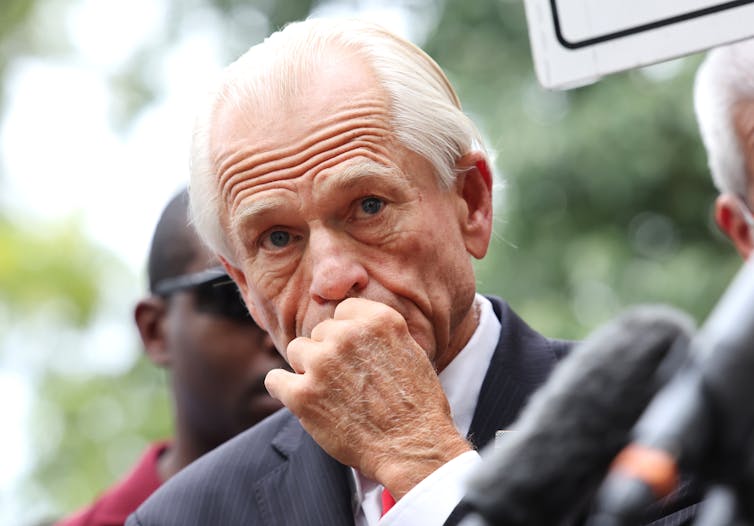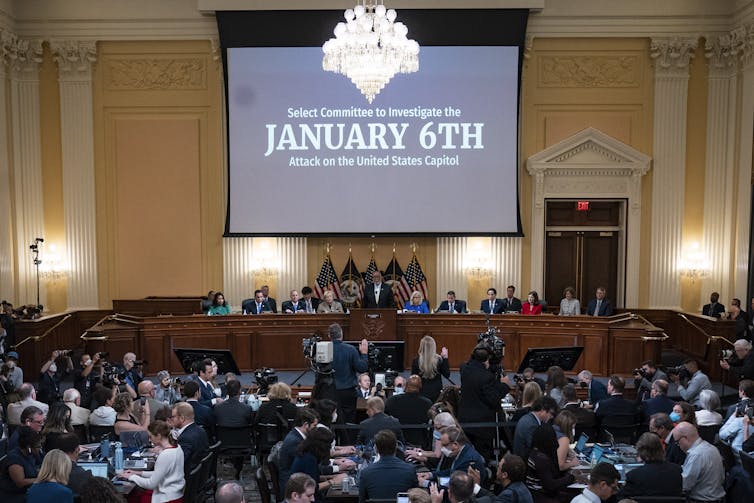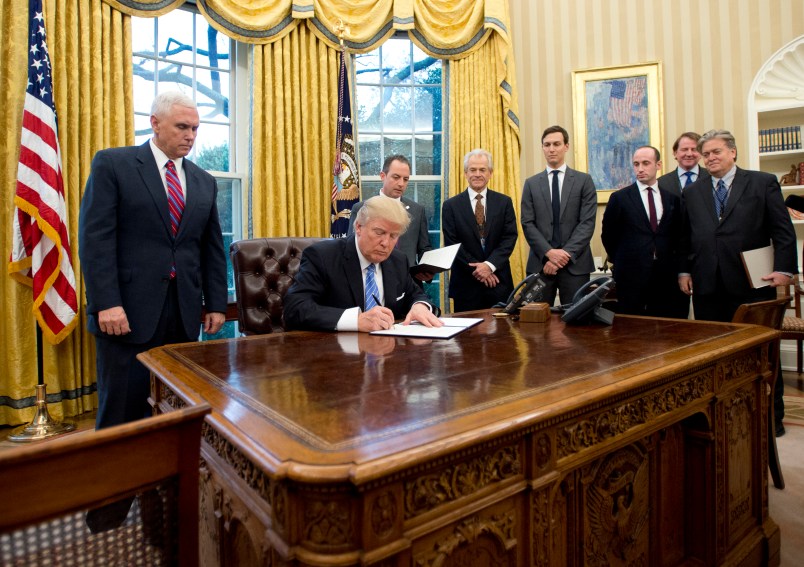This article is part of TPM Cafe, TPM’s home for opinion and news analysis. It was originally published at The Conversation.
On Jan. 25, 2024, Peter Navarro is scheduled to be sentenced – perhaps to prison – after his swift conviction by a jury on contempt of Congress charges. He has joined Steve Bannon as the first defendants in decades to be held criminally liable by the U.S. Department of Justice for refusing to provide information in response to congressional subpoenas.
The Supreme Court has long supported Congress’ authority to obtain information needed to carry out its constitutional duties. But weak enforcement tools have made getting that information difficult, especially from the executive branch.
As a former chief counsel for the Senate Permanent Subcommittee on Investigations, I view the jury convictions of Bannon and Navarro as reviving the use of criminal proceedings as an enforcement option for Congress, offering a potent tool for holding powerful people accountable if they defy the legislative branch. How often that option will actually be used in the future, however, remains unclear.
The cases
The Bannon and Navarro subpoenas were issued by the House Select Committee to Investigate the January 6th Attack on the United States Capitol.
The subpoenas required both men to testify before the committee and produce documents related to the 2020 presidential election and the January 2021 attack.
But Bannon and Navarro declined to provide any documents or even to appear before the committee as the subpoenas directed. Both claimed they did not have to comply with the subpoenas because, as presidential advisers, they were absolutely immune to congressional orders and because former President Donald Trump had asserted executive privilege over the requested information – which meant they couldn’t produce it to Congress.

The committee and the full House voted to hold the subpoena recipients in contempt of Congress. The committee referred their cases to the Department of Justice, requesting prosecution under a federal law that says if Congress refers a case, the Department of Justice shall present it to a grand jury.
Bannon was tried in July 2022; the jury took only three hours to return a guilty verdict. Navarro went to trial on Sept. 7, 2023; the jury found him guilty the same day. Bannon was sentenced to four months imprisonment and fined $6,500; Navarro awaits sentencing. Both men have said they will appeal their convictions.
Criminal penalties
Congressional investigations are part of the Constitution’s system of checks and balances and can include examining actions taken by the executive branch.
In the past, for example, Congress has evaluated government waste, fraud and abuse; troubling covert intelligence operations; and government misconduct.
When Congress begins asking questions, executive branch officials have sometimes refused to provide requested information.
Using its authority granted in the Constitution, Congress has previously imprisoned individuals for defying a congressional subpoena. But that last occurred in 1935.
When Congress has referred cases to the Department of Justice under the law requiring presentation to a grand jury, the department has routinely declined to prosecute executive branch officials who are following presidential instructions to withhold information. Essentially, the department hasn’t chosen to prosecute officials from its own administration.
The change in pattern in the Bannon and Navarro cases may have occurred in part because the Biden Justice Department was asked to prosecute people associated with the Trump administration, and the withheld information involved a matter of rare constitutional significance.
The Bannon and Navarro convictions demonstrate for the first time in over 80 years that if the Department of Justice chooses to use them, statutory criminal prosecutions and penalties offer a feasible and forceful tool to protect congressional inquiries.
The House committee that requested the information from Bannon and Navarro has disbanded, so the two criminal cases will not be supplying it with any new information. But the contempt prosecutions, if they end up punishing the defendants’ misconduct, could create a potentially significant deterrent to those thinking about defying a congressional subpoena.
Executive privilege
Another key aspect of both cases involves the issue of executive privilege. Executive privilege enables the president to withhold information from Congress when it is in the public interest. President George Washington was the first to articulate the principle in 1792.
The Supreme Court first recognized executive privilege as constitutionally legitimate in United States v. Nixon, while also ruling that President Richard Nixon could not use the privilege to quash a grand jury subpoena of conversations recorded in the Oval Office, because “fundamental” due process and fairness required the prosecutor to have access to the tapes as part of a criminal inquiry. The Supreme Court has since provided little additional guidance on how to claim executive privilege or what it protects.
Both Republican and Democratic administrations have subsequently claimed that, due to executive privilege and other separation of powers concerns, presidential advisers are absolutely immune to congressional subpoenas, despite court rulings to the contrary.
In Trump v. Mazars, when President Trump sought to block the disclosure of certain personal financial documents to Congress, the Supreme Court pointedly ignored his claims of absolute immunity to congressional subpoenas. Instead, the court established a new test enabling Congress to subpoena certain information involving the president and sent the cases back to the lower courts to apply the test to the subpoenas at issue.
Following that Supreme Court guidance, the Bannon and Navarro district courts rejected the defendants’ immunity claims, although it is likely the defendants will bring up the issue again in their appeals.

Also significant is that the two district court judges in the Bannon and Navarro cases refused to allow either defendant to raise an executive privilege defense at trial.
In the Bannon case, the court held that he never proved that Trump asserted executive privilege over the requested information and that, while Bannon was an adviser to Trump in 2017, he was not in 2020, which was the time period covered by the congressional subpoena. In the Navarro case, while Navarro was a presidential adviser in 2020, the court found him unable to prove that Trump ever asserted executive privilege over the subpoenaed information.
The inability to prove Trump instructed either of them to assert privilege suggests that neither defendant will be able to offer a strong executive privilege argument in their appeals.
Strengthening Congress
Unless reversed, the Bannon and Navarro cases have nudged open a door that had been effectively closed for 80 years, showing that federal prosecutors and juries can use criminal penalties to hold powerful political players accountable.
While their appeals continue, the two cases already suggest that criminal as well as civil enforcement of congressional subpoenas can work. If the convictions are upheld on appeal, Congress could even consider ways to make criminal prosecution a more viable option, perhaps by legislating new authority enabling Congress to require appointment of a special prosecutor to handle cases involving executive branch officials.
If Congress could appoint a special prosecutor, it would not have to rely on the Department of Justice to bring a prosecution. Of course, the special prosecutor would still have to try the criminal case in court before a judge and jury.
Equally important, the two cases may clarify the legal limits on executive privilege and absolute immunity.
The appeals court could, for example, bar future absolute immunity claims by executive branch officials subpoenaed by Congress. It could also make clear that executive privilege requires specific evidence to succeed in court. That includes proof that a current or former president asserted privilege, that the defendant was a presidential adviser at the relevant time, and that the defendant appeared before Congress and claimed the privilege on a question-by-question basis.
If the appeals court sustains those requirements, clarifying what has to be proved to assert executive privilege could affect not only criminal but also civil enforcement efforts, strengthening the hand of Congress when facing nebulous assertions of executive privilege.
The D.C. Court of Appeals held oral argument in the Bannon case on Nov. 9; the Navarro case will follow. How the appeals process unfolds will determine the extent to which the Bannon and Navarro contempt of Congress convictions will create an effective deterrent to executive branch defiance of Congress’ authority to subpoena information. Curbing noncompliance with congressional subpoenas promises, in turn, to strengthen Congress’ ability to serve as a constitutional check on the executive branch.
This article is republished from The Conversation under a Creative Commons license. Read the original article.







I have said this from the first days of the administration of TFG, now currently out on bail:
The people making money hand over FRIST in his administration will be the lawyers – criminal lawyers, “constitutional lawyers,” prosecutors, appellate court lawyers, and so on. The lawyering goes on forever, and so does the passing of money. This does not make me feel good about this country. But it could always be worse: fighting out our differences with guns.
“Both Republican and Democratic administrations have subsequently claimed that, due to executive privilege and other separation of powers concerns,…”
Yes there are separation of powers but there is also balance of powers, which makes one branch hold another one accountable, esp. when breaking the law.
Maybe both of these schmucks can have their convictions voided by just firetrucking dropping dead while the convictions are under appeal.
Now prosecute Gym Jordon for same. Nobody is above the law.
Good FRIST but you need this, too.